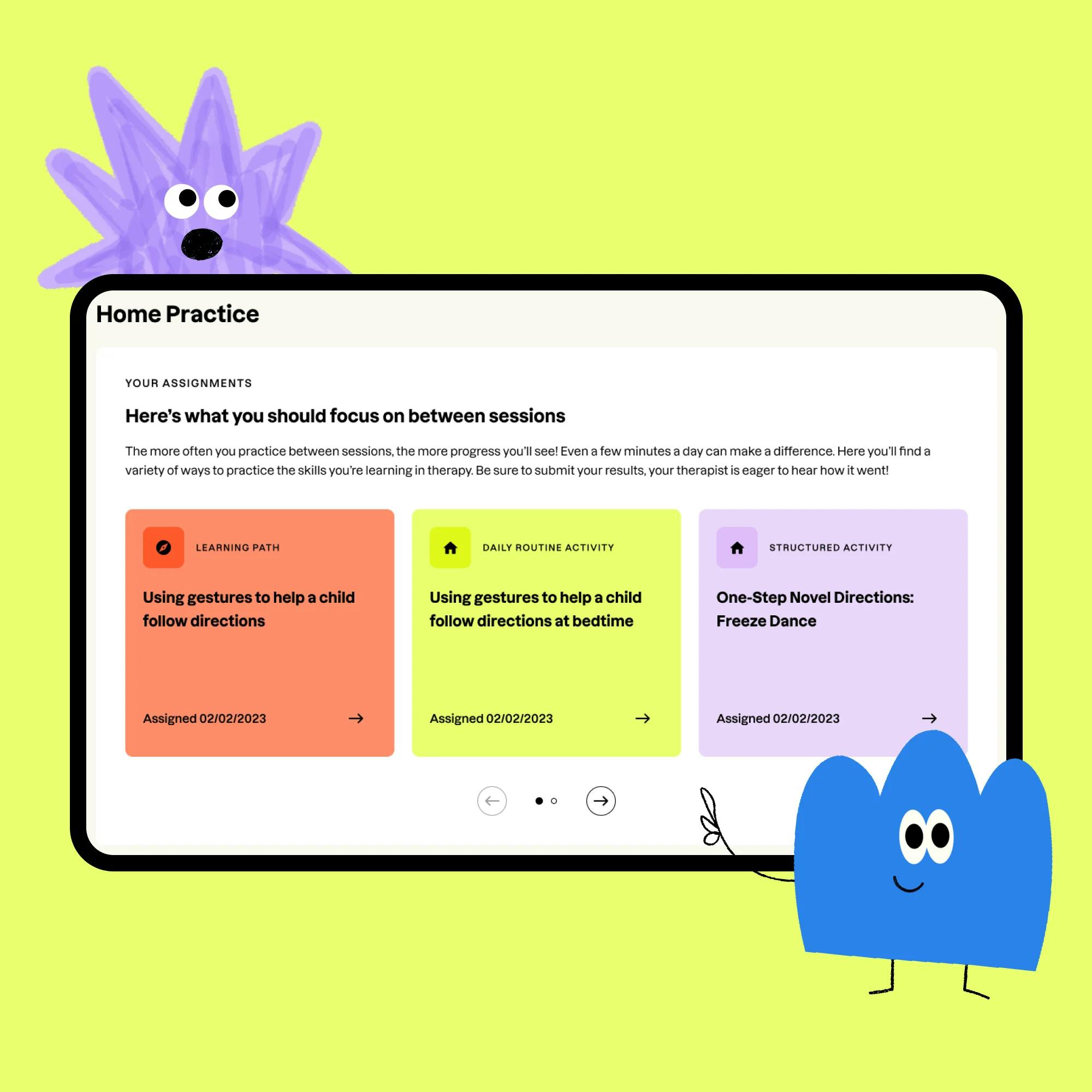
Online Speech Therapy: The Biggest Advantages for Speech Therapists
 Leanne Sherred, M.S., CCC-SLP
Leanne Sherred, M.S., CCC-SLP
Let’s start by getting this out of the way: just like teletherapy isn’t perfect for every client, it’s not a great fit for every speech-language pathologist (SLP). We all have different working styles, skill sets, and preferences, and online speech therapy doesn’t hit those high notes for everyone. That’s perfectly fine!
However, for SLPs considering the switch to teletherapy, or who want to supplement their existing caseload with online care, let’s talk about some of its many advantages.
First, a quick note about my background. Before starting Expressable, I spent my career working in a variety of settings, including pediatric outpatient clinics, schools, early intervention, and home health. Over time I become frustrated by many of the limitations when providing conventional, in-person care. Once I discovered online speech therapy, I didn’t look back.


Improved access to speech therapy for clients
While everyone becomes an SLP for different reasons, it ultimately comes back to the joy, excitement, and pride we experience when helping others. Whether it’s hearing a client say their first word, nail that pesky /r/ sound, overcome a fluency disorder, or regain their ability to communicate basic needs, the sense of accomplishment is unmatched. The work we do has life-changing potential, and the more people that have access to quality services, the better.
While all SLPs deserve to be compensated fairly, the truth is our services can be out of reach for many Americans. We’ve all dealt with the heartbreak of insurance coverage denials and the painful cycle of re-authorizations. What’s more, out-of-pocket therapy costs can be unattainably expensive, and many of us have watched families struggle financially and make personal sacrifices to afford services. While 44 million Americans are eligible for speech-language pathology services in the United States, nearly 45% of eligible children aged 3-17 are not receiving treatment.
The work we do has life-changing potential, and the more people that have access to quality services, the better.
Teletherapy can drastically reduce costs, helping reach more patients and expanding caseloads. At Expressable, for example, we don’t have to pay many of the typical expenses required for physical practices and clinics, such as rent, utilities, office supplies, furniture, overhead and administrative fees. Telepractices can pass these cost savings down to their patients, while still compensating SLPs generously and competitively, so more families can access quality care.


No more commuting (hooray!)
I lived in Austin, Texas, for a long time, and like many metropolitan cities around the country, traffic moves at a snail's pace. When working in home health, I can’t tell you how many times I’d drive 45 minutes to a client’s house only to realize they weren’t home or had canceled their appointment. Plus, this commuting time needlessly fills your calendar, preventing you from treating more patients.
You got into speech therapy to spend quality time with patients and focus on their progress, not spend mindless hours sitting in a car. To me, this is one of the biggest lifestyle advantages of online speech therapy.
Scheduling flexibility
With online speech therapy, you often have greater control over your schedule and a wider range of appointment times. For example, many of the SLPs at Expressable have young children and prefer to schedule sessions around daycare or nap time. Others would prefer to break up their week by not working certain days. Some aren’t morning people, and they prefer to set their availability starting at noon and don’t mind working evenings.
These scheduling advantages also extend to families trying to fit in speech therapy around busy school and work schedules.
Whatever you prefer, online speech therapy gives you greater flexibility in prioritizing your commitments and shaping your work week. This sense of freedom not only leads to peace of mind, but ensures you never lose sight of work-life balance.


Reduced risk of illness
Let’s face it: Going into an office or school everyday and working with kiddos can put SLPs at higher risk for getting sick. Not only does teletherapy reduce your exposure to illness, but it also protects your patients.
Improved relationships with clients
I’m passionate about the role parents and caregivers play in reinforcing speech and language practice at home to improve their child's progress. This isn’t just born from my own experiences and observations. Research also supports the importance of parent involvement in reaching clinical goals.
Teletherapy makes building and cultivating relationships with parents much easier.
Unfortunately, when I practiced speech therapy in other settings, this was one of my biggest pain points. In schools, my interactions with parents were extremely limited, usually for an hour or so during their annual IEP meeting. In a clinic, I saw parents briefly for a few minutes in the lobby after the session.
Teletherapy makes building and cultivating relationships with parents much easier. Because there’s more flexibility in appointment scheduling, parents and caregivers can more easily join the sessions alongside their child or loved ones. This makes it easier to engage and educate them so they can continue promoting speech and language goals at home throughout the week.


The comforts of home
My fridge, my music, my bathroom, my temperature controls, my workspace. Not trying to sound overly possessive here, but practicing therapy in a comfortable environment matters--both for you and for your clients. As long as you’re able to stay focused and discourage distraction, you should revel in this increased flexibility: Take an afternoon walk, do some mid-morning yoga, grab a snack, cuddle your dog.
Collaboration with other speech therapists
Expressable's team of speech therapists numbers more than 200. That means loads of opportunities for mentorship and collaboration. Whether you need a professional opinion, new tips and tricks, or a resource to share with a client, you'll have a community of clinicians you can work with and depend on.
Wider scope of care
As you know, speech therapy covers a wide scope of care, including many diagnoses and ages. Everyone has clinical specialities as well as preferred populations they feel more comfortable and knowledgeable treating. Online speech therapy provides more flexibility in shaping your caseload to be as wide or narrow in scope as you’d like. By breaking down geographic limitations, this also ensures clients are paired with a speech therapist best suited to their needs.


Effective care
With every new and innovative model of care, questions naturally arise about its effectiveness. Teletherapy is no different.
Yes, there are certain conditions that may benefit from the tactile interaction of in-person care, such as swallowing. And yes, transitioning to teletherapy requires an adjustment period for some SLPs.
However, a mound of research has shown that online speech therapy can be just as effective as traditional, in-person care. In fact, the American Speech-Language-Hearing Association (ASHA) has recognized teletherapy as a valid means of service delivery for speech therapy disorders based on a strong body of evidence.
It’s our job as SLPs to be informed on how to effectively practice teletherapy, as well as educate our patients on expectations. Online speech therapy is a powerful tool in maintaining quality of care while expanding access to more families.
Learn more about working at Expressable
Expressable employs SLPs from around the country. If you’re an SLP looking for remote work, check out our current openings, or reach out to us at recruiting@expressable.io. You can also sign up for our career newsletter, Elevate, to stay up-to-date on all things career-related at Expressable. We'd love to connect with you!
How Expressable Can Help
Concerned your child isn't reaching age-expected milestones? Looking for communication support from a professional? Expressable is a national online speech therapy practice serving children and adults. We treat all major areas of communication and feeding, offer flexible hours including evenings and weekends, and accept most major health insurance plans. We’re proud to have earned more than 3,000 5-star reviews from our clients (4.9/5 average).
Our therapy model is centered on parent and caregiver involvement. Research proves that empowering caregivers to participate in their loved one’s therapy leads to better outcomes. That’s why we combine live, 1-on-1 speech therapy with personalized education and home practice activities for faster progress.
Communication is more than words. It’s how we share how we feel and show who we are. We’re here to help you or your child do just that.









